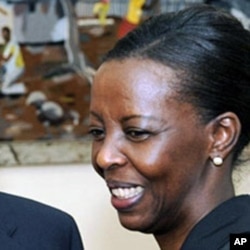Rwandan President Paul Kagame has wrapped up a trip to Britain, where he stressed the benefits of his country's new membership in the Commonwealth.
The flag of Rwanda was raised Monday alongside those of the other 53 members of the Commonwealth.
Speaking at the Royal Commonwealth Society Tuesday, Mr. Kagame said there were a number of benefits for Rwanda of joining the Commonwealth. He said trade and investment were pivotal.
Foreign Minister of Rwanda, Louise Mushikiwabo, told VOA Rwanda is a stable country looking to develop its economy.
"We are looking at investment from both members and individual businesses in the member countries in the areas of mining, in ICT, in education of course, in areas also as interesting as broadcasting -- so we have a lot we think we can gain from being a member of the Commonwealth," she said.
The Commonwealth of Nations is an intergovernmental organization of 54 independent member states.
Rwanda was admitted in November 2009 after a six-year bid to join the organization.
The member states cooperate within a framework of common values including the promotion of human rights. But humanitarian groups have criticized the African country for violations of human rights and limits to freedom of expression. And in March, the Commonwealth Human Rights Initiative voiced its own concern over political repression in the country during the run-up to presidential elections set to take place in August.
But Mushikiwabo says Rwanda must be judged in the context of its history.
"We are a country that has moved from genocide to stability and so there is no worse violation of human rights than genocide so it's important to put into perspective where Rwanda has come from and where Rwanda is today," said Mushikiwabo.
All but two member states of the Commonwealth, Rwanda and Mozambique, were formerly part of the British Empire. Rwanda is a former Belgian colony.
Most Commonwealth countries are English-speaking, but some bilingual countries such as Canada have dual membership in both the Commonwealth and the rival Francophone organization spearheaded by France.
Rwanda's relationship with France has been tense in recent years. In 2006 a French judge implicated Mr. Kagame in the killing in 1994 of then-President Juvenal Habyarimana.
Rwanda has accused France of involvement in Rwanda's 1994 genocide in which around 800,000 people were killed.
But recently Rwanda and France have been rebuilding their broken ties and Mushikiwabo says the decision to join the Commonwealth is not a dig against the Francophone country.
"Rwanda's joining the Commonwealth has nothing to do with France. Rwanda's joining the Commonwealth is in the pursuit of opportunities and openness for Rwandan citizens," she said.
Alex Vines is an Africa analyst at the London-based research group Chatham House. He says Rwanda's decision to join the Commonwealth is designed to show that it's not mired in its colonial past.
"The joining of the Commonwealth is partly a message to France that Rwanda is a hybrid-country where although it was colonized by Belgium, it doesn't sit naturally just in the Francophone world and so the multiple memberships of these types of organizations is important to it," he said.
Vines says he thinks human rights in Rwanda will be under tighter surveillance now that the country is part of the Commonwealth - and this should lead to more freedoms in the country.
"I think this will mean now that Rwanda will be held to account, that the Commonwealth Human Rights Initiative, which is based out of New Delhi, will visit Rwanda more regularly now and so the Rwandans will need to be cognizant of these issues," Vines said.
Presidential elections are set to take place in Rwanda in August - they will be the second presidential polls since the 1994 genocide.









